DINESH KUMAR MURUGESAN Head HR - India, DSM / happiness is success
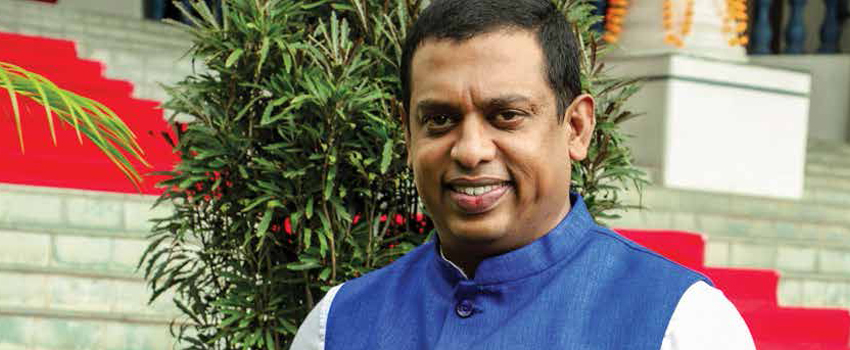
While technology and the Internet have brought a lot of ease in many aspects of recruiting and human resource management, new challenges have come on the scene, least of all being the loss of human touch. In the new paradigm, it is imperative for HR to become wholly business centric, for companies to take on the new, all-invasive digital technology as opportunity rather than threat, and for aspiring professionals to learn to embrace variety in opportunity, says Dinesh Kumar Murugesan, Head HR – India, DSM, in a tête-à-tête with Corporate Citizen…
‘Whether it is a boardroom or the leadership team, HR heads have the seat on the table, but we have not figured out what to do with the seat. There is always a struggle between what is the agenda, do I drive the business agenda or do I drive the HR element in it? We have to now understand that there is only one agenda and it is the business agenda’
‘During my time, I used to do several other things, apart from what I was hired for. That’s how I learnt many things that helped me. I never dared to tell my boss, ‘this is not my job’; but today they bluntly tell you so. That, in my view, is making them very narrow minded’
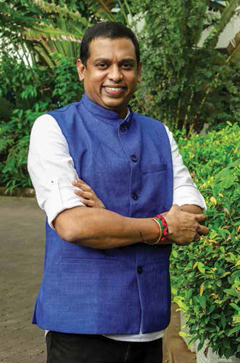
Dinesh Kumar Murugesan, Head HR - India, DSM is a versatile Human Resources Leader, with nearly 20 years career dotted with success in Human Resource Management encompassing People Strategy and Business Planning, Talent Acquisition, Performance Management, Innovative Employee Engagement, Competency Mapping, Compensation & Benefits, and Organizational Development. DSM N.V. (Royal DSM, commonly known as DSM), the company Murugesan works for, is a Dutch multinational active in the fields of health, nutrition and materials. Headquartered in Heerlen, DSM employs about 25,000 people in around 50 countries and posted net sales of over €8 billion. He speaks about his professional success and varied thoughts on life…
DSM is a multi-national company, focussing on Science, Sustainability and nutritional specialities. Could you elaborate on its operations in India?
Ours is a Science-based company with two clusters – one is Material Sciences and the other is Life Sciences. Under Material Sciences, we have DSM Engineering Plastics, Resins and Dyneema. In DEP, we produce solutions for electric appliances, automobiles and the base for odour-free and stain-free paints. Leading paint manufacturers are our customers. We also specialize in the manufacture of Dyneema, strong but lightweight material used for making bullet-proof jackets, helmets and amours (worn by soldiers). But that is not all. Dyneema is used in several other products. In the Life Sciences cluster, we make food for poultry, fisheries, dairy and some seafood for fish in the ocean. The vitamins we produce is for the animals, so that they become healthy, which in turn makes it healthy for human consumption. Another product under nutrition is supplying vitamins that gets into personal care products. Hindustan Unilever and Fair & Lovely are our customers.
You mentioned that you do not produce raw materials but you produce solutions. Could you elaborate?
For example, we produce a material named Akulon, a base polymer which is used for making plastic moulds. This is made up of two to three chemicals; our company has researched on how to manufacture it. So, the raw material is taken from the soil and we process it and sell it to application manufacturers like the makers of car mirrors. We supply to OEMs (Original Equipment Manufacturers) like automobile companies. So we are intermediaries for companies like Tata Motors, Maruti and so on.
What is the annual turnover of the company?
Globally it is around nine billion dollars and in India, we are a three hundred million dollar company. Globally, we have 25,000 employees and 800 in India.
Do you manufacture organic products in Life Sciences?
Yes, we are fully organic and we have a sustainability strategy. DSM is one of the renowned companies for sustainability as we stand for 3Ps - people, planet and profit. We first say people, by this we mean our employees, vendors, customers and our society. Planet, as we make sure that whatever we do should have a positive impact on the planet. Finally talking of profit, we take care of the people and planet and that leads to profit.
What are the qualifications required for employees to be hired in DSM?
There are two kinds of employees - blue collared and white collared. Blue collar qualification does not matter much but we recruit highly skilled people but when it comes to white collar employees, we mainly prefer chemical engineers for our R&D and doctorates in the field. When it comes to marketing and finance professionals, supply chain management and operations management, we look for MBA graduates. Now, we are taking MBAs who have graduated in human resource development.
"The human touch is diminishing everywhere, not only in hiring but also in interaction amongst employees in offices. People are talking on phones and interacting on emails more than sitting across the table, even though they work in the same office"
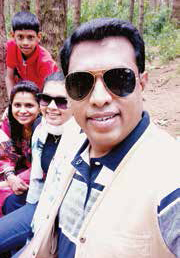
Tell us about yourself. Which was your first job and where did you start your corporate career?
I did my MBA in Human Resource Management, Chennai, after I graduated in Computer Science Engineering. I’m a Madrasi, born and brought up in Chennai. Then I was hired from campus by NIIT. I started with an education and training company and worked with them for about four and a half years. Then I moved to TCS where I worked for three and a half years. TCS transferred me from Chennai to Hyderabad, so I moved to Hyderabad in 2005. Then after TCS, it was a tryst with Deloitte. Thereafter, I joined Bank of America and then DSM, where I have been working for the last seven years. I used to switch companies every three to four years but I’m looking to work with DSM for several more years, as it is a fantastic company to work for.
In the last two decades, how has the role and complexion of HR changed?
Things have changed drastically. If I have to state it in a very grassroots manner, I started my career as a recruiter when there was no Internet and even to release an advertisement in the newspaper, I had to take approval from ten people. Hiring itself was a big challenge. Every recruitment that I made was really like capturing a kill. It used to give me a high sense of accomplishment and get me great recognition. I used to go to Aptech who were our competitors, pose as a student and interact with the faculty to build my own database, to hire faculty for NIIT. There was a lot of room for thinking and exploration. Today the whole recruitment business has become relatively easy with Internet and social media, but on the other hand, it is killing innovation. Earlier, I had to explore new ideas to get contacts. Today people have thousands of contacts on their social media. The physical connect between people is diminishing.
Is the personal touch also missing in recruitment due to technology?
The human touch is diminishing everywhere, not only in hiring but also in interaction amongst employees in offices. People are talking on phones and interacting on emails more than sitting across the table, even though they work in the same office. If they are in different blocks, they do not even speak to each other. At DSM, when people are communicating over calls we encourage them to do video conferencing so that at least we see each other and have that element of human interaction.
Is there a trend of candidates not joining, even after selection and after being given the job offer?
I am an HR professional and understand the pain of the person not joining and I feel it has a lot to do with the recruiter who does not keep the candidate who is scheduled to join, engaged. For, if you are talking to the person, it also makes him or her responsible to adhere to the commitment. If I am hiring people, especially at the senior level, I make it a point to call them every week.
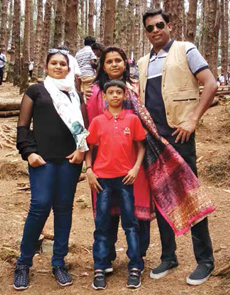 Dinesh Kumar with wife Priya,
Dinesh Kumar with wife Priya,daughter Roshni and son Shriram
What is now the HR’s responsibility in this era of technology?
It is a difficult question. Purely my view, I could be wrong, but I would like to use this opportunity to say that HR has for several years fought for what they call the ‘seat on the table’. Whether it is a boardroom or the leadership team, HR heads have the seat on the table but we have not figured out what to do with the seat. There is always a struggle between what the agenda is, do I drive the business agenda or do I drive the HR element in the strategy? We have to now understand that there is only one agenda and that is the business agenda. If you look at CFOs, they are not confused at all. Their agenda is business and they do everything in their domain of finance whether it is cost control or making the report or generating profit. They do their job but they speak business. It is only in HR that there is this confusion. We should also be very clear.
So the mindset has to change…
Yes, the mindset has to completely change; that I am a businessperson sitting on this table, with people management responsibility and that I have to drive the people strategy, but ultimately there is only one agenda – Business Growth – revenue and profit.
You have recruited many youngsters over the years. What is your opinion about young managers who join in and your advice for them…?
The knowledge level is definitely increasing. I have a teenager at home and the kind of things that she speaks now, I did not even know existed even when I was in my thirties. Millennials are very educated, very intelligent and with a lot of resources. The other side is that they are also becoming very narrow-minded and lazy. Narrow-minded, which they call ‘clarity’. During my time, I used to do several other things, apart from what I was hired for. That’s how I learnt many things that helped me. I never dared to tell my boss, ‘this is not my job’; but today they bluntly tell you so. That, in my view, is making them very narrow-minded. I am not saying that they have to be very submissive. If today, I have a campus recruit in the learning and development team and I ask that person to do something that falls in the recruitment space I get an immediate answer – ‘that’s not my job’. That shows their confidence but I would have viewed it as an opportunity in disguise.
Murugesan: To win over technology, embrace technology
‘The only factor that still distinguishes between machines and us is thinking. We have to look at skills that distinguish people’s cognition, which use more of thinking skills, analytical skills’
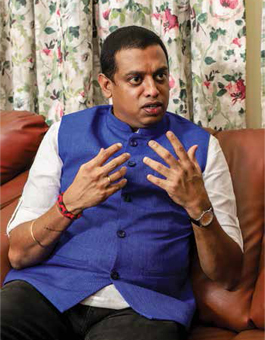
The entire world is going digital. Digitisation, automation and robotisation will cut jobs, according to MGI (McKinsey Global Institute). They say 30% of the roles, which are being done by people, will be automated. Another survey says, 25% of the workflow is going to be automated, which means machines are going to do what humans used to do. The challenge here is you cannot fight with technology and win. But there is also an opportunity, the opportunity is to embrace technology. That is the only way to win over technology.
The rate at which companies are growing now is because they are digitalizing, embracing technologies. Traditional companies had to cross 50-60 years to cross the $100-200 billion mark. New-age companies which embrace technology are crossing the $500 billion mark in 5-10 years. This growth is rapid, and those companies continue to grow. There are three categories of companies - digital giants, traditional players that are current industry leaders like Disney, Coca Cola, PepsiCo, DSM, which still have stable revenues are good, and lastly, you have ambitious entrepreneurs who are coming in. Companies like Microsoft, Apple, Alphabet are digital at their core. Does Microsoft or Apple have an impact only in the IT industry? They are redefining industry standards.
Tesla, Uber, Airbnb, Flipkart, Netflix are quickly adapting to what technological giants are creating. The giants are creating a platform, these ambitious companies are catching-up to the platform and redefining the way business is being done. These ambitious entrepreneurs are across industries. No matter which company you get in, digital is going to be the way ahead.
The nature of jobs is changing drastically. That is what AI and Digitalization will do to all of us. Nowadays, people talk about how AI and digitalization will affect jobs-is it really true? Initially, when computers came in, everybody said the same thing. Similarly, when Apple launched a touch phone, what did people say? People said it would not work but now everybody has touch phones. The same thing will happen here as well. AI and Robotic Process Automation (RPA) will create a completely new set of jobs, nobody is going to do the same kind of jobs they have done earlier.
AI and RPA are going to create a new set of jobs, especially in the area of modern management. When human beings started their lives in the Stone Age, the only thing they did for their survival was hunting. Initially, they were using stones to hunt. Then tools came into existence and then they upgraded the version of tools using stones, animal’s bones; they improvised on the tools and made them into machines. Then we moved to a stage where we said, training is for animals and learning is for human beings. So, learning was the distinguishing factor. Now, we have machine learning. Machines have started learning also. The only factor that still distinguishes between machines and us is thinking. We have to look at skills that distinguish people’s cognition, which use more of thinking skills, analytical skills. That is what will help us keep our jobs as we move forward.
Customer experience is a concern, which companies must focus on in order to grow. I was told in the first job that it is the customer who pays the salary to an employee. If he/she stops paying for your services or your product, the salary of employees will stop. If you look at companies like Alphabet, Amazon, Microsoft-they are very high tech companies but what are they doing? They are actually providing what the customer wants-the market is more and more a customer-consumer driven market. They decide what they want and if you don’t deliver, your business is going to die. That is what is happening to most of the traditional companies which do not upgrade, which don’t revolutionize the products, and so on.
KEY SKILLS
Programming, application development, analytics, data science, and customer-centricity is essential for your survival in the corporate world. If you look at the mission statements of companies which are at the top, you will find that ‘customer’ is mentioned as one of the most important things. Not that their business did not focus on consumers before; then, the customer was somebody who was part of the business; now, the customer has moved to the top of the business. Now, all you need to develop is customer-centric thinking.
Businesses don’t change, people do. Competition, of course. If you are in any business, there will be competition. You should have the right talent, the right products, and it should focus on the right market. The crucial factor though is the right mind-set, which you need to work upon. When I started working, things were very hierarchical now things are more open. The working style is becoming more about collaboration. Collaboration means you have to take the lead; those who stand up and speak will get recognized. You are expected to have broader knowledge. You should have continuous learning, if you don’t then you will be replaced by a bot.
The situation in India is changing; brand India is really becoming better. India gets recognition as a rising superpower and the responsibility lies in your hand to take it forward.
By Vineet Kapshikar
"Businesses don’t change, people do. If you are in any business, there will be competition. You should have the right talent, the right products and it should focus on the right market. The crucial factor though is the right mind-set, which one needs to work upon"
Isn’t that a bad attitude?
Attitude is a strong word. Attitude is something when you realize what you do is wrong and you still do it. I would call this as innocent arrogance. We need to help them change.
You mentioned laziness….
Everything is available for them at the click of a button. They do not even have to walk for food; everything comes at the doorstep. They are getting more dependent on technology, which is not bad. We should use technology to make us more effective but not lazy. In my MBA days, I had to struggle to do my research paper but now they get information at their fingertips so now I don’t know whether the knowledge they take is real knowledge or fake.
How would you rate them as employees?
The future lies with them so I definitely would not underrate them. If I have to rate them on a scale of 1-10, I will rate them 8.
What is the advice that you would like to give millennials?
My advice to them would be to be more open-minded and when they start working, if some new opportunity comes to their plate, they should try to grab it and learn, rather than saying no. If someone says you are in a marketing job but can you work for a couple of months in the HR team, then he or she should be ready because the ultimate motive is to become a CEO. And people who really want to reach that level, never hesitate to take on more responsibilities but such youngsters are rare. I want the younger generation to be more curious and to learn more.
What do you think about business schools? Is their syllabus aligned with the needs of the corporate world?
Earlier institutions were going by the directions given by the Educational Boards and were complacent but today they want to be relevant. That is a big change. I do not discuss politics but I would say that the current business environment is much better. The government really wants business to grow, be involved in business imports and exports; so it has become easier to do business with India than it was a decade ago. Business is not just about getting a license and selling. Infrastructure is important. The roads between ports, the highways between cities are having an impact on business development and economic growth.
What do you think of the economic slowdown?
India can’t help it because the top two economies of the world – the US and China are in a trade conflict. This economic war is going to have an impact on countries across the globe. The impact on India is going to be high because we are the third-largest economy. One of the most stable banks in the world says they are going to crash. I’m no economic analyst but all indicators are pointing in a direction that in March 2020 there will be an economic slowdown and it will be there for at least a year.
Tell us something about your family.
I married my colleague. I first hired her and I moved her into my company. Then she hired me and moved me into her family. When TCS transferred me, she had to let go of her HR job. When we moved to Hyderabad, she was in the family’s way and so took a break. She pursued fashion designing and sells fashionable wear, to keep alive her passion and keep herself engaged constructively. My daughter is 13 years old and my son is nine.
How challenging is it to be a parent?
I have very well behaved children so it is not challenging at all. My wife takes care of them and I give her more than 100% credit. Work keeps me busy and I am a very social person. So, I do a lot of things to stay connected.
What makes a marriage work?
My first honest advice would be do not marry at all! Why struggle, if you are going for a divorce? I am just joking! I think it is again the human touch which is getting lost in this relationship too. In the name of modernization, they are losing their moral values and losing out on bonding with each other. Earlier, couples hardly knew each other before marriage but they did everything to get along with each other. Now, youngsters are dating and living together before marriage to know each other well; but in spite of all that, they get divorced. I am not able to understand this phenomenon. It is perhaps because of the fast pace and lesser tolerance level.
What’s the philosophy of life that you live by?
I don’t teach my children how to be rich. I teach them how to be happy. It makes a big difference because not everyone who is rich is happy. Being happy allows them to be what they want to be. Therefore, I believe happiness is of prime importance.